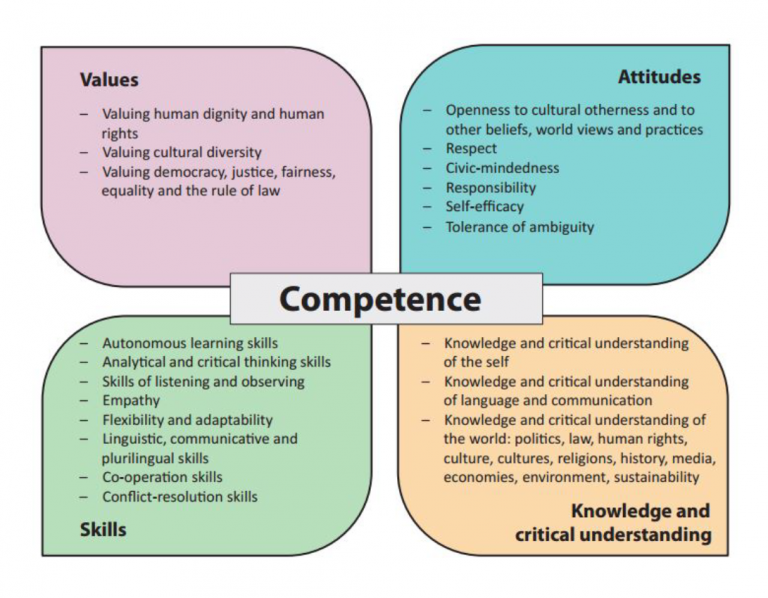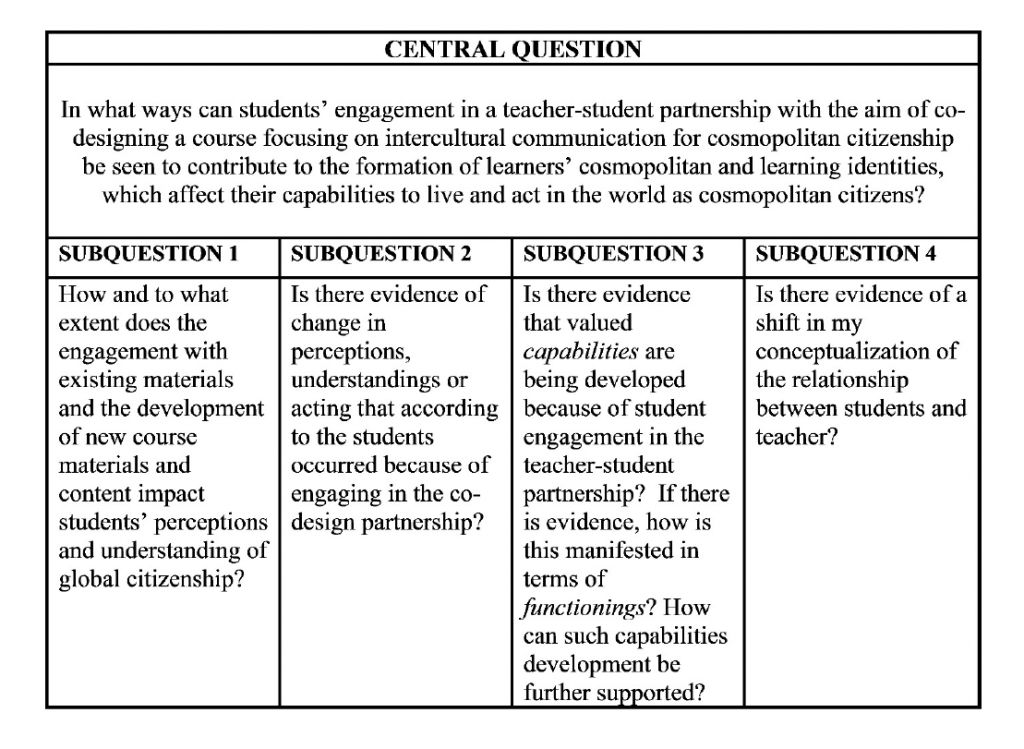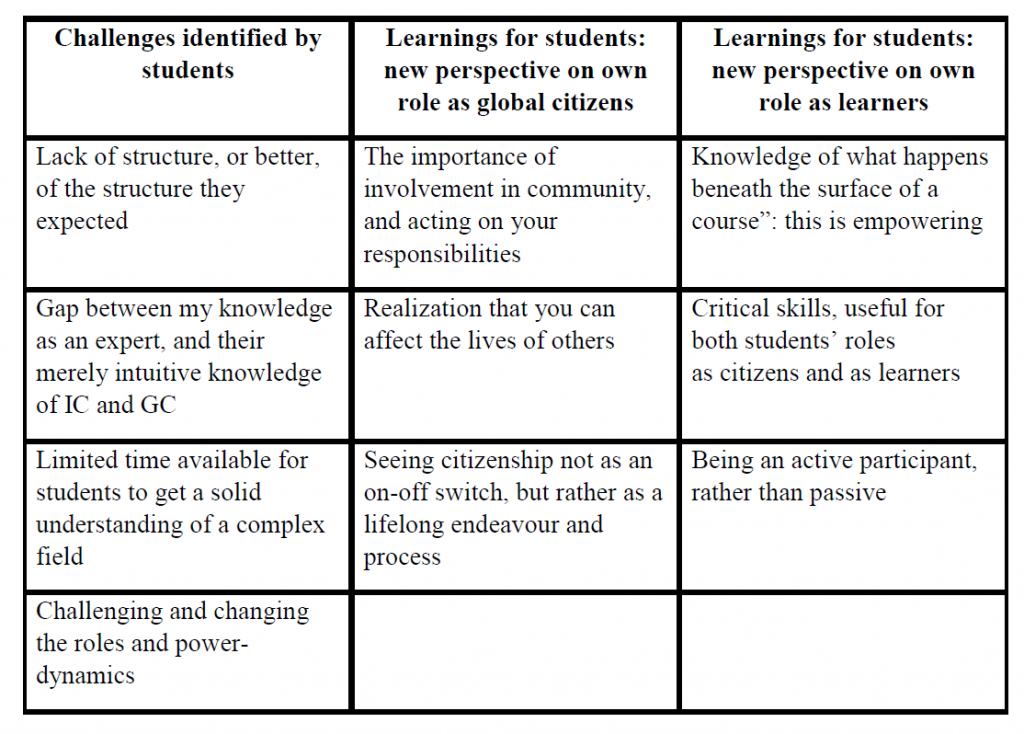by Tatiana Bruni
This paper presents some preliminary outcomes of a student engagement experience undertaken at an undergraduate college in the Netherlands. Six students and an alumna participated in a teacher-student partnership with the researcher to co-design a new course in critical intercultural communication. The teacher-student partnership was envisioned as a laboratory of democracy, aimed at offering students a site where the institutional educational objectives concerning global citizenship were examined by those to which they apply. Experimenting with democratic processes of co-creating learner environment and knowledge that matter to students is seen as a form of active community engagement. Preliminary analysis of the qualitative data collected show that engaging with theories of global citizenship in a setting of democratic pedagogy impacts on students’ perception of themselves as global citizens and as learners. In both cases, whilst challenging, students seemed to adopt a more active role.
This article was initially published as part of Durham University’s ‘Imagining Better Education: Conference Proceedings 2018’
Introduction
Our educational systems and schools need to prepare young people to become active, participative and responsible individuals: the complex, multicultural and rapidly evolving societies we live in cannot do with less (Council of Europe, 2018a, p. 7).
The educational philosophy of the institution where I teach resonates with this statement: the college aims at developing values and attitudes essential for contemporary democratic societies, such as respect for others, self-reflection, aiming for the common good, active participation as a citizen, and international understanding, thus preparing graduates to take social responsibility and be committed to any community in which they may come to operate. This aim is however not supported by specific curricular and pedagogic strategies and actions. The acquisition of intercultural competence is seen as deriving from the fact that students live and study in our multicultural campus and learning about global issues and perspectives in class. Relying on informal acquisition of values and attitudes for democratic citizenship is, according to Barrett, Byram, Lázár, Momport-Gaillard, and Philippou (2013), not sufficient:
“Intercultural competence may not be acquired spontaneously by individuals, and it may not be acquired simply through exposure to and encounters with people with other cultural affiliations. However, intercultural competence can be enhanced through a range of intercultural experiences …. through intercultural education and training” (p. 13).
In general, I am interested in exploring pedagogy that enables students to meet our institutional learning outcomes, hence I engaged in a research process that would enable me to be innovative in my teaching practices in order to offer students an experience of intercultural education. What sparked the idea for the pedagogic action that I designed and carried out is my interest in how students perceive the link between being/becoming global citizens and participating and contributing to (a democratic) society. I asked myself the following questions: do the learning outcomes we formulated resonate with them? Can we enhance their development of global citizenship by taking their ideas and needs into account? How can I shape my teaching practices to support such development?
Framing my pedagogic intervention
While there seems to be an unequivocal consensus in educational settings on the importance of education for citizenship, the field itself is extremely broad, and the literature offers a plethora of models listing competences, skills and knowledge which need to be acquired by individuals “if they are to become effective participatory citizens and live peacefully together with others as equals in culturally diverse societies” (Council of Europe, 2016, p. 15). For example, the CoE has developed a conceptual model of twenty competences for democratic culture:
“which enable citizens to participate effectively in a culture of democracy … [where] institutions and laws cannot work in practice unless they are grounded in a culture of democracy, that is, in democratic values, attitudes and practices” (Council of Europe, 2016, p. 15).

Educators wishing to apply CDC in their teaching are recommended to foster democratic processes in the classroom, which create conditions for learners to experience democratic processes first-hand. This can empower “learners and stimulate them to use these competences in the classroom, in the school and in society” (Council of Europe, 2018b, p. 31). This means adopting pedagogies that fosters democracy and equality in the classroom through dialogue and engagement; by involving students in co-creating knowledge and learning, and by creating an inclusive community of teaching and learning where teachers also are willing to learn from students.
One way of fostering student engagement is through faculty-student partnerships, which is “a collaborative, reciprocal process through which all participants have the opportunity to contribute equally, although not necessarily in the same way, to curricular or pedagogical conceptualization, decision making, implementation, investigation or analysis” (Cook-Sather, Bovill, & Felten, 2014, p. 6).
Among the benefits of student engagement for both students and staff there are enhanced teaching and learning practices, together with the feeling, for students, of being heard and being able to make a valuable contribution to the teaching and learning environment. Partnership work usually challenges and changes the power-dynamics between teacher and students (Bovill, 2013), which is often seen a major challenge, not only for teachers who may fear the lettinggo of some of the ‘power’ that their role entails, but also for students, who may not be up to the amount of responsibility that they are charged with. Other challenges can be time investment and the fear of not having enough experiences and skills (Bovill, Cook-Sather, & Felten, 2011).
Engaging in a faculty-student partnership could potentially realize what Michael Fielding, in his typology of six patters of partnership, each of which entailing a different power relation, has termed intergenerational learning for lived democracy. It is the most comprehensive of the six, and it emphasizes “a joint commitment to the common good, and … include[s] occasions and opportunities for an equal sharing of power and responsibility” (Fielding, 2011, p. 72). The research design described below was a response to these considerations and personal interests.
The research design
By employing qualitative modes of enquiry, I attempt to illuminate to what extent the learning and lived experiences that took place in the partnership could make a difference in terms of the students’ capabilities enhancement, agency and identity development. The central research question and the sub-questions which I formulated are outlined in table 1.

The partnership was organized at an international undergraduate liberal arts & science program in the Netherlands between March and June 2017. Participants were recruited through an open call to give all students the opportunity to participate. They applied using a form where they stated background, motivation for engaging in the partnership and expected personal contribution and challenges. In the end, the partnership consisted of six students (three males and three females, either in their second or their final year), an alumna who was my paid teaching assistant, and me. It was run as an assessed internship, in which students were required to actively participate as well as write a short reflective journal.
We had nine 4-hour long weekly sessions. In the final session, we evaluated the process and the outcome of our work (the outline of the new course). The first four sessions were mainly conceptual: students needed to dive into fields unfamiliar to them, and we discussed terms and concepts we would be using. We first compared the vision of our college about educating for global citizenship with programs in other universities and international organizations, and with the literature in the field. We then created our own working definition of global citizenship, from which to derive the intended learning outcome for a course in intercultural communication that would fit into the college’s curriculum.
Moving from conceptual work to pedagogical practice proved to be difficult, so activities were carried out to understand principles of constructive alignment, which is the relationship between learning outcomes, learning activities and assessment tasks (Manchester Metropolitan University, 2018). Being able to understand and apply these principles to the emerging course framework became a real turning-point in the experience of students because from this moment on, they felt confident that we would be able to translate conceptual work into pedagogy for the new course. In the final session, we wrote a draft course outline to be presented to the stakeholders for approval, and we evaluated the partnership experience together. Students also submitted written reflective essays on their individual experience, as was required for the internship.
Data collection and analysis
The collected data set consists of application forms, reflective journals of the participants (RJ), my field notes, an interview with a teacher and two focus group conversations. These are my core data items, as they represent thoughts or reflections of the participants. Other data account more for the process, such as minutes of meetings or the various versions of the course outline which show how our thinking was progressing towards the end-product. These data sets play a supporting role.
The core data will be analysed using Thematic Analysis (TA), which is a method for identifying, analysing and reporting patterns (themes) within data, described by Braun and Clarke (2006). To find evidence of change, my coding should capture ideas, thoughts and feelings before, during and after the partnership. The first of the six phases of TA, the familiarization phase was already applied to three subsets of the data: the application forms, the focus groups and the reflective journals. Table 2 shows some preliminary themes that have been identified.
Preliminary findings

Shifting power relations
The challenges identified reflect those described in literature about partnership (Bovill, 2014; Bovill & Felten, 2016; Cook-Sather et al.,2014). In particular, the knowledge gap between the students and me, however inevitable, hampered changing the power relations. Vicky (third year) wrote that this gap:
made it difficult to really feel that I as a student was on the same level as the teacher, it sometimes felt like it was not my place to give feedback or to voice my opinion on something (RJ).
Nonetheless, after what we called the alignment exercise, students felt empowered and confident in contributing. Sem (second year), wrote:
I have always felt inferior to teachers, but now I feel, perhaps disagreeably, as an equal. Not … in knowledge, but an equal in importance and power. I feel more appreciated in my academic life (RJ).
Mary (third year) appreciated:
most about the partnership-structure … the fact that it facilitated an environment where ideas, opinions, needs and experiences were easily shared and were of worth to the designing process (RJ).
These reflections seem to indicate that inter-generational learning for lived democracy was realized to some degrees.
Students’ role as learners and as citizens
Students reflected on having developed new perspectives about their role as learners and having become more active participants:
the internship has given me new insights on how teaching is a two-way street. It has shown me that I am the
boss of my own education and that I am partly responsible for its quality (Sem, RJ).
On the other hand, gaining new perspectives on one’s role as a global citizen, as this touches on personal values and norms, didn’t come easily. There is however evidence that when such a shift occurred, students took a more active role in society. Andy (second year) has noticed himself becoming:
more engaged in society and having more of a will to be the ‘ideal global citizen’ as it were (RJ).
Mary reflected that:
Challenging oneself to be critical about your own thoughts and opinions is a tough thing to do; it requires
willpower. Similarly, challenging other people’s views is not easy. To have seen this stressed during the meetings, however, I believe might encourage me to keep doing so in the future (RJ).
Both students thus show a commitment to engage and act, to move from awareness to praxis outside of their educational setting, where they could practice with democratic engagement.
Conclusion
This paper describes the design, implementation and preliminary outcomes of a teacher-student partnership created between the researcher and undergraduate students to co-create a course in critical intercultural communication. The aim was to engage students in a form of democratic community engagement to develop critical global citizenship and to foster inter-generational learning for lived democracy. The findings discussed here are very preliminary: they have been identified while familiarizing with three data subsets (application forms, evaluation focus groups and reflective journals).
Nonetheless, they suggest that engaging students in a teacher-student partnership for curriculum co-design can contribute to the formation of learners’ cosmopolitan and learning identities, thus affecting their capabilities to live and act in the world as cosmopolitan citizens. The challenges identified can lead to formulating recommendations for teachers considering implementing partnership-based pedagogy.
Suggested citation: Bruni, Tatiana (2019) ‘Acts of Willpower: Developing Cosmopolitan Citizenship Through Student Engagement in Course Design’ in Imagining Better Education: Conference Proceedings 2018.Durham, England: Durham University, School of Education, pp. 31-43. Imagining Better Education. Available here

Drs. Tatiana Bruni is a lecturer of Italian Language and Culture and tutor at University College in Utrecht University, Netherlands. She is also currently undertaking Durham University’s EdD on a distance programme, and has recently been granted a Matariki fellowship to go to University of Western Australia later in 2019.
Get in touch with her here.

